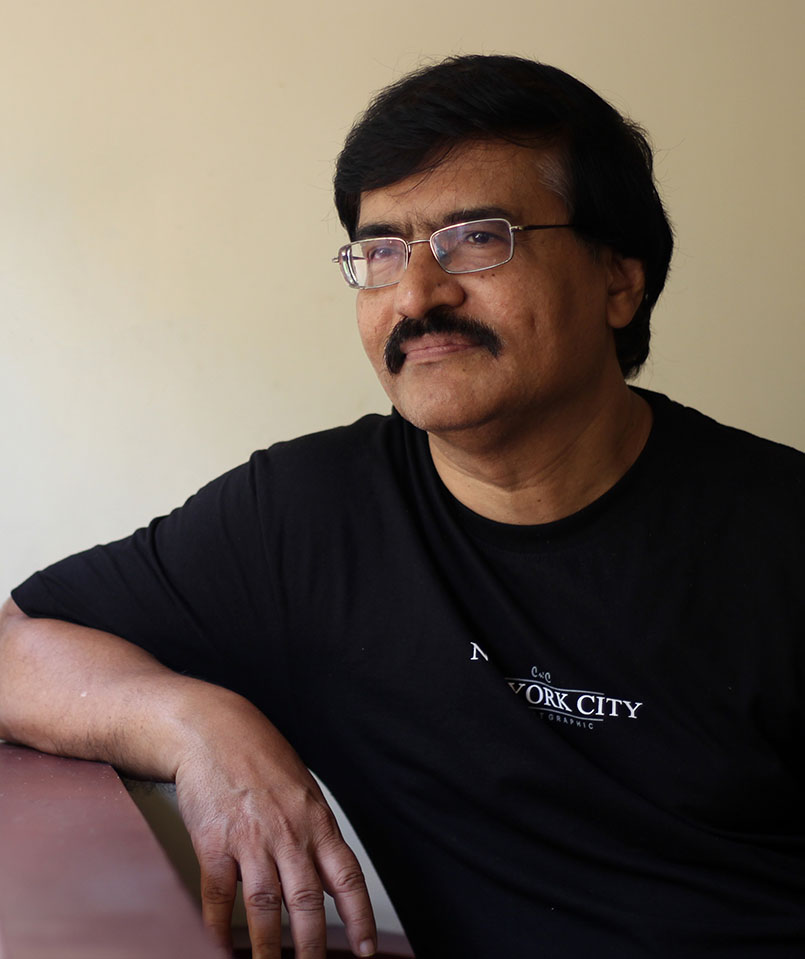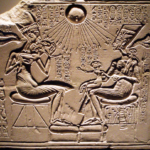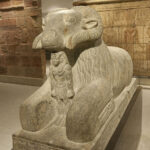“No ills befall the righteous, but the wicked are filled with trouble.”
(Proverbs 12:21)

We are all troubled by the unfair distribution of suffering in the world. Time after time, we see the wrong people get sick, the wrong people get hurt and the wrong people die young. The misfortunes of good people are not a problem to the people who suffer and to their families alone. They are also a problem to everyone who wants to believe in a just and fair world. The headlines of the daily newspaper and the news channels throw fresh challenges to the idea of a livable world and loving God in control of affairs of the world. The news that hit us every day is that of brutal violence, senseless murders, accidents that kill and cripple people, war, terrorism, plagues, pandemics, natural disasters, atrocities, illness, injustice, hunger…. They inevitably raise questions about the goodness and even the existence of God. And when bad things happen to good people, it is not easy to convince people who suffer that life is fair and that God gives people what they deserve and need.
Of course, there are not perfect human beings. But we often find ourselves asking why ordinary people, nice friendly neighbours, neither extraordinarily good nor extraordinarily bad, should suddenly have to face the agony of pain and great and great personal tragedies. In a fair and just world, they do not seem to deserve the sufferings to which they are subjected to. Why should the lives of reasonably good people be so much harder? Why do the righteous suffer in this world? Why ordinary people should have to bear extraordinary burdens of grief and pain. Incidentally, an interesting aspect of such incidents is that the faithful who are stricken by such disasters in life tend to discover some flaw in their own religious behaviour as the cause of their suffering, for they are indoctrinated from the start to believe that all blessings are the gift of God and all disasters are the consequence of man’s sin.
Let us look briefly into some of the real-life stories to demonstrate the way people think:
A middle-aged couple had just one child – a bright and bubbly nineteen-year-old girl who was in the university. One morning at breakfast, her parents received a phone call from the university. The caller said, “We have some bad news for you. Your daughter collapsed while walking to her class this morning. It seems a blood vessel burst in her brain. She died before we could do anything for her. We’re terribly sorry.” Stunned, the parents asked a neighbour to come in to help them decide what steps to take next. The neighbour notified the Synagogue and the young Rabbi in charge went over to see them. This Rabbi Harold S. Kushner says, “I entered their home, feeling very inadequate, not knowing any words that could ease their pain. I anticipated anger, shock, grief, but I didn’t expect to hear the first words they said to me: “You know, Rabbi, we didn’t fast last Yom Kippur.” (In Judaism, Yom Kippur is a solemn and major fast day; its observance is one of the requirements of the Jewish religious law).
Another true story goes like this: an eleven-year-old boy was given a routine eye examination at school. It was found that he was just near-sighted enough to require glasses. No one was terribly surprised at the news. His parents both wear glasses, as does his older sister. But for some reason, the boy was deeply upset and would not tell anyone the cause of his consternation. Finally, one night as his mother was putting him to bed, the story came out. A week before the eye examination, the boy and two older friends were looking through a pile of trash that a neighbour had set out for collection. They found a copy of the Playboy magazine. With a sense that they were doing something sinful, they leafed through the pages looking at the pictures of unclothed women. When, a few days later, the boy failed the eye test, he jumped to the conclusion that God had begun the process of punishing him with blindness for looking at those pictures!
Why do people look for some transgression to justify disasters in life? Why do they assume that they were somehow responsible for the tragedies that befall them in life? Who taught them to believe in a God who would strike people with disasters for displeasing Him? One of the ways in which people have tried to make sense of the world’s suffering in every generation has been by assuming that we deserve what we get and that our misfortunes come as punishment for our sins. The fact is that the Bible apparently teaches so. It says, for example, “Tell the righteous it shall be well with them, for they shall eat the fruit of their deeds. Woe to the wicked, it shall be ill with him, for what his hands have done shall be done to him. (Isaiah 3:10–11) It also says, “Consider, what innocent ever perished, or where have the righteous been destroyed?” (Job 14:7)
This is an attitude cultivated by religious scriptures. It is tempting at one level to believe that bad things happen to people (especially other people) because God is a righteous judge, who gives them exactly what they deserve. By believing that, we keep the world orderly and understandable. We give people the best possible reason for being good and for avoiding sin. And by believing that, we can maintain an image of God as all-loving, all-powerful and totally in control of worldly matters. Given the reality of human nature, given the fact that none of us is perfect and that each of us can, without too much difficulty, think of things he has done which he should not have done, we can always find grounds for justifying what happens to us and leave the honour of God intact! But how comforting and how religiously adequate are such an answer?
Rabbi Harold Kushner says that the parents, who had lost their only child at age nineteen with no warning, were not profoundly religious people. They were not active in the synagogue; they had not even fasted on Yom Kippur, a tradition which even many otherwise non-observant Jews maintain. But when they were stunned by tragedy, they reverted back to the basic belief that God punishes people for their sins. They sat there feeling that their daughter’s death had been their fault; had they been less selfish and less lazy about the Yom Kippur fast some six months earlier, she might still be alive. They sat there angry at God for having exacted His pound of flesh so strictly. But they were afraid to admit their anger since they feared that God would punish them again for being displeased with Him. Life had hurt them, and religion could not comfort them. Religion was making the victims of tragedy feel worse. (Harold S. Kushner, When Bad Things Happen to Good People).
The idea that our misdeeds cause our misfortune, is a neat and attractive solution to the problem of evil at several levels. But it makes people hate God, even as it makes them hate themselves. How can anyone who recognizes the names Auschwitz or has walked the corridors of hospitals and mortuaries, dare to answer the question of the world’s suffering by quoting Isaiah, who says, “Tell the righteous it shall be well with them”? To do that, one would have to say that a righteous person was anyone who lived long and well, whether or not he was honest and charitable. Also that a wicked person was anyone who suffered, even if that person’s life was commendable otherwise.
Sometimes we try to make sense of life’s trials by saying that people do in fact get what they deserve, but only over the course of time. We may argue that if we wait long enough, we will see the wicked withering away and the righteous flourishing. So, for example, the Ninety-second Psalm praises God for the wonderful, flawlessly righteous world He has given us, and hints that foolish people find fault with it because they are impatient and don’t give God the time it takes for His justice to emerge. For the Psalm says, “When the wicked spring up like grass, And workers of iniquity flourish, It is that they may be destroyed forever… The righteous shall flourish like the palm tree, And grow mighty like a cedar of Lebanon…To declare that the Lord is upright, My Rock in Whom there is no unrighteousness.”
The psalmist here suggests that foolish and impatient people see the prosperity of the wicked and the suffering of the upright and jump to the conclusion that it pays to be wicked. Let them observe the situation over the long run and they will see the wicked wither like the grass, and the righteous prosper slowly but surely, like the palm tree or cedar. If I could meet the author of the Psalm, I would be obliged to point out that there is a lot of wishful thinking in his theology. The world is not so neat a place as the psalmist would have us believe. Think of a young woman dying of cerebral hemorrhage or the sole bread winner of a family dying in a road accident or a whole family wiped out in a terrorist attack… What have these people for the ‘long run’?
Sometimes religious people would like to believe that God has good reasons for making us suffer – reasons that they are in no position to judge. Now, how seriously would we take a person who said, “I have faith in Adolf Hitler; but I can’t explain why he did the things he did, but I can’t believe he would have done those things without a good reason.” Yet people try to justify the deaths and tragedies God inflicts on innocent victims with almost these same words. If a human being made children suffer claiming that something immensely impressive or valuable could come to pass, we would put that human being in prison. Why then should we excuse God for causing such undeserved pain, no matter how wonderful the ultimate result might be?
Can suffering be educational? Can suffering cure us of our faults and make us better people? We are often told that God treats us the way a wise and caring parent treats a naive child – keeping us from hurting ourselves, withholding something we may think we want but actually harmful to us, punishing us occasionally to make sure we understand that we have done something seriously wrong… And we patiently endure all these “unfairness” in the confidence that we will one day mature and understand that it was all for our own good. Such arguments are buttressed with the Bible verse, “For whom the Lord loves, He chastises, even as a father does to the son he loves.” (Proverbs 3:12)
The problem with such a line of reasoning is that it is meant primarily to defend God. Such justifications are thought up by people who believe very strongly that God is a loving parent who controls what happens to us. They adjust and interpret the facts to fit their assumption. It may be true that sometimes we have to do painful things to people we love for their benefit, but not every painful thing that happens to us is beneficial. A parent who disciplines a child for doing something wrong, but never tells him what he is being punished for, is hardly a model of responsible parenthood. Yet, those who explain suffering as God’s way of teaching us to change, never specify just what it is that we are supposed to change! It offends me to hear people suggesting that God creates retarded children so that those around them will learn compassion and gratitude. Why should God make an innocent child suffer all its life in order to enhance my spiritual sensitivity?
Many parents of dying children are urged to read the twenty-second chapter of the Book of Genesis to help them understand and accept their burden. This chapter in the Bible tells how God orders Abraham to take his son Isaac, whom he loves, and offer him to God as a human sacrifice. We are told that God had Abraham go through that ordeal to test his loyalty and the strength of his faith. For the benefit people who have difficulty with the notion of a God who plays such sadistic games with His most faithful follower, it often explained that God knew how the story was to end. If God already knew, then why God made the father and son go through the pain and trauma? In this story, Abraham’s son did not die. But around us innocent children suffer and die and parents live groaning all through their lives! Would we still claim that God knew what was happening and refused to interfere?
Writer Harriet Sarnoff Schiff, whose young son died during an operation to correct a congenital heart malfunction, paints her pain and tragedy in her excellent book, The Bereaved Parent. She writes how her clergyman took her aside and said, “I know that this is a painful time for you. But I know that you will get through it all right, because God never sends us more of a burden than we can bear. God only let this happen to you because He knows that you are strong enough to handle it.” Harriet Schiff remembers her reaction to those words: “If only I was a weaker person, Robbie would still be alive.” We have seen cancers and automobile accidents take the life of one member of a family, and functionally end the lives of five others, who could never again be the normal, cheerful people they were before disaster struck. Did God test the strength of the family before causing such disasters? If indeed God is testing us, we know from our experience that God miscalculates far too often!
A five-year-old boy ran out into the street after a ball. He was hit by a car and killed. In the eulogy, the family’s clergyman said, “This is not a time for sadness or tears. This is a time for rejoicing, because Michael has been taken out of this world of sin and pain with his innocent soul unstained by sin. He is in a happier land now where there is no pain and no grief; let us thank God for that.” Such nonsense! Not only had the parents of the boy lost their child without warning, they were being told by the representative of their religion that they should rejoice in the fact that he had died so young and so innocent! Can any parent rejoice at such moments? The parents felt hurt, they felt angry, they felt that God had been unfair to them… Yet we often hear such nonsense in the course of funerals. And sometimes in our reluctance to admit that there is unfairness in the world, we try to persuade ourselves that what has happened is not really bad. We only think that it is…
Because our souls yearn for justice, because we so desperately want to believe that God will be fair to us, we often fasten our hopes on the idea that life in this world is not the only reality. Somewhere beyond this life is another world where “the last shall be first” and those whose lives were cut short here on earth will be reunited with those they loved, and will spend eternity with them. But no living person can know anything about the reality or otherwise of an afterlife. We know that our physical bodies decay after we die. Many believe that the part of us which is not physical, the part we call the soul or personality does not die. Are we capable of imagining what a soul without a body looks like? Will we be able to recognize disembodied souls as being the people we had known and loved? Some people might cite the authority of the Scripture to argue that the dead would rise up with their bodies. People can speculate anything since nothing can be proven! Belief in a world to come where the innocent ones are compensated for their suffering can help people endure the unfairness of life in this world without losing faith. But it can also be an excuse for not being troubled or outraged by injustice around us. Since we cannot know what happens after death, we would be well advised to take this world as seriously as we can, for it might turn out that our current life on earth is the only one we will ever have…












Sir, i call your writing as Practical Spirituality!!!
Wonderful!!
Regards
Thank you Shrish…
Hi.
Came over to your Blog after quite some time, and enjoyed the labor of your inquisitive mind.
The piece is essentially a well-reasoned critique of what an intelligent human being would perceive as flawed (or at the very least incomprehensible) reasons that the clergy or the devout may provide to explain away the inconsistencies therein.
But what next?
[ On a personal level, can you send me yours and Mathew George’s telephone numbers by email? Thanks. ]